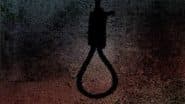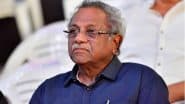New Delhi, Apr 28 (PTI) Honour killing must get a strong measure of punishment, the Supreme Court on Monday said and upheld the conviction of 11 accused for the "dastardly murder" of a young couple in Tamil Nadu in July 2003.
A bench of Justices Sudhanshu Dhulia and Prashant Kumar Mishra refused to interfere with the Madras High Court's June 2022 verdict that upheld the conviction and sentence of the accused persons, including two police officers.
The bench said the victims -- Murugesan and Kannagi -- who were in their early twenties were killed by administering poison in full view of a large number of villagers.
The masterminds and the main perpetrators of this "macabre act" were none other than the father and brother of the woman, it added.
Also Read | Gold Rate Today, April 28: Gold Prices Drop INR 1,000 to INR 98,400/10 gm Amid US-China Trade Deal Optimism.
The top court observed the reason behind the murder was that Kannagi belonged to the "Vanniyar" community whereas Murugesan was a Dalit from the same village in Cuddalore district.
The couple secretly married in May 2003.
"So, at the root of this crime is the deeply entrenched hierarchical caste system in India, and ironically, this most dishonourable act goes by the name of honour-killing," the bench said in its 73-page verdict.
Advocate Priyadharshni Rahul appeared for Murugesan's family.
"A crime is an act against the state. But a wicked and odious crime, as the one we have just dealt with, is the ugly reality of our deeply entrenched caste structure. Honour-killing, as these are called, must get a strong measure of punishment," it said.
The bench awarded a compensation of Rs 5 lakh to Murugesan's kin and said the amount was liable to be paid by Tamil Nadu government.
The amount was stated to be over and above the amount directed to be paid as compensation by the sessions court and the high court.
On the role of the police officers, the bench said both committed the offences under Section 217 of IPC and the Scheduled Castes/Scheduled Tribes (Prevention of Atrocities) Act, 1989 as they neglected their duties and disobeyed the law by not registering the FIR at the first instance with the intention to save the culprits.
Section 2017 of the erstwhile IPC dealt with public servant disobeying direction of law with intent to save person from punishment, or property from forfeiture.
The bench said Murugesan's family moved the high court, which in April 2004 directed hand over of the probe to CBI.
Though the incident took place in July 2003, the trial was concluded only in September 2021, it added.
"The long and inordinate delay which has been caused in this case, right from the lodging of the FIR, speaks volumes about the gross inefficiency at the hands of the prosecution on the one hand and dilatory tactics employed by the defence on the other hand, which together led to a slow trial," the verdict said.
Witnesses turning hostile was underlined to be one of the key events in the case.
"This phenomenon is not new, in fact it is sadly a common occurrence in our criminal courts today, much to the despair and frustration of the prosecution," the bench said.
"But then the purpose of a trial court is to go to the truth of the matter. Whatever evidence is there before the court must be examined, tested, corroborated (whenever necessary), before a verdict can be finally given," it said.
The bench noted one of the many reasons for witnesses turning hostile was the long delay usually caused in a trial.
"This is again unfortunate but true in our country," it said, "and it took 18 years to pronounce verdict in the case by the trial court".
The court underscored the presence of "enough material" placed by the prosecution in the trial court turning sufficient to prove the guilt of the accused beyond a reasonable doubt.
The bench directed those on bail in the case to surrender within two weeks to undergo their remaining sentence.
Of the total 15 accused who faced trial in the case, 13 were convicted.
Of the 13, 11 were punished for murder and one of the convicts was awarded death sentence by the trial court whereas the rest were sentenced to life imprisonment. It came on record that the high court acquitted two accused.
The two police officers were also convicted by the trial court and both were sentenced to life term.
The bench noted the high court commuted the death sentence to life term.
While the conviction of one of the police officers was modified and his sentence was reduced to two years, the conviction and sentence of other cop was upheld by the high court.
(This is an unedited and auto-generated story from Syndicated News feed, LatestLY Staff may not have modified or edited the content body)













 Quickly
Quickly














